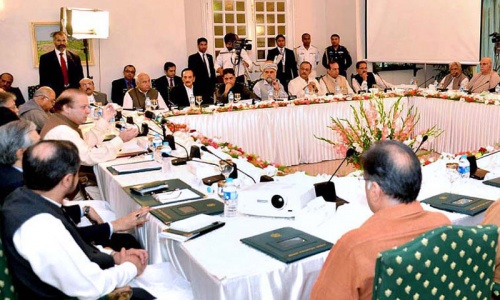KAKUL: Pakistan’s army chief said Saturday that although the military supports peace talks, it is capable of effectively using force against anti-state Taliban militants as “a last resort.”
“The national leadership has decided to give dialogue a chance to deal with the issue of terrorism and Pakistan army fully supports this process,” Chief of Army Staff General Ashfaq Parvez Kayani said while addressing a passing out parade of cadets at the Pakistan Military Academy in Kakul.
“The nation and the political leadership have to determine the parameters for holding such a dialogue... this process should bring unity among the nation instead of leading to a division,” he said.
For this, the army chief stressed, it was imperative that the process of negotiation is pursued under and in accordance with the Constitution of Pakistan.
“The military will be more than happy if a solution to the problem is found through dialogue,” he said, adding that the use of force would be the last option.
Kayani, who is retiring from his post next month at the end of a second tenure as army chief, dismissed speculations that the failure of counter-insurgency operations forced the military to go for dialogue.
“This is far from being a truth,” he said, pointing to the successful 2009 military operations in the northwestern town of Swat, which was cleansed of terrorists within four months.
During the televised address, the general said it was essential to find a solution to terrorism which he described as negating the basic ideology of the nation and the teachings of Islam.
At an All-Parties Conference (APC) last month, Pakistan’s main political parties backed a government proposal to seek negotiations with the militants, who have been waging a bloody insurgency against the state since 2007.
But the umbrella Tehrik-i-Taliban Pakistan (TTP), a loose coalition of militant groups led by Hakimullah Mehsud since 2009, responded with a list of preconditions.
These included a government ceasefire, withdrawal of troops from the tribal areas along the Afghan border where the militants have hideouts, and an end to US drone strikes.
Prime Minister Nawaz Sharif Thursday said his government was sincere about holding peace talks with the Taliban, after TTP chief Mehsud complained that no serious steps had been taken to open a dialogue.
Speaking after a security meeting in the troubled northwestern city of Peshawar, Sharif said progress was being made on the issue of opening negotiations.













































